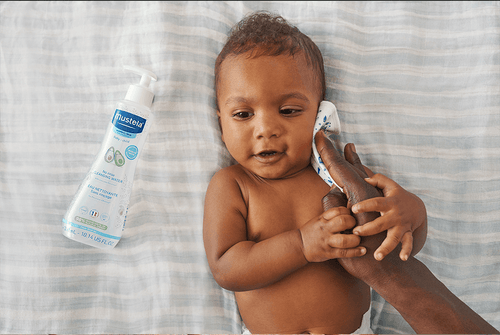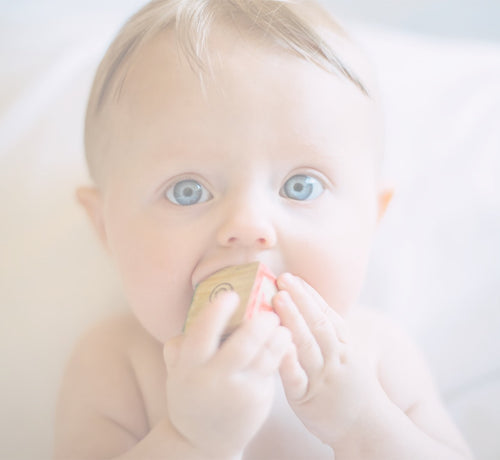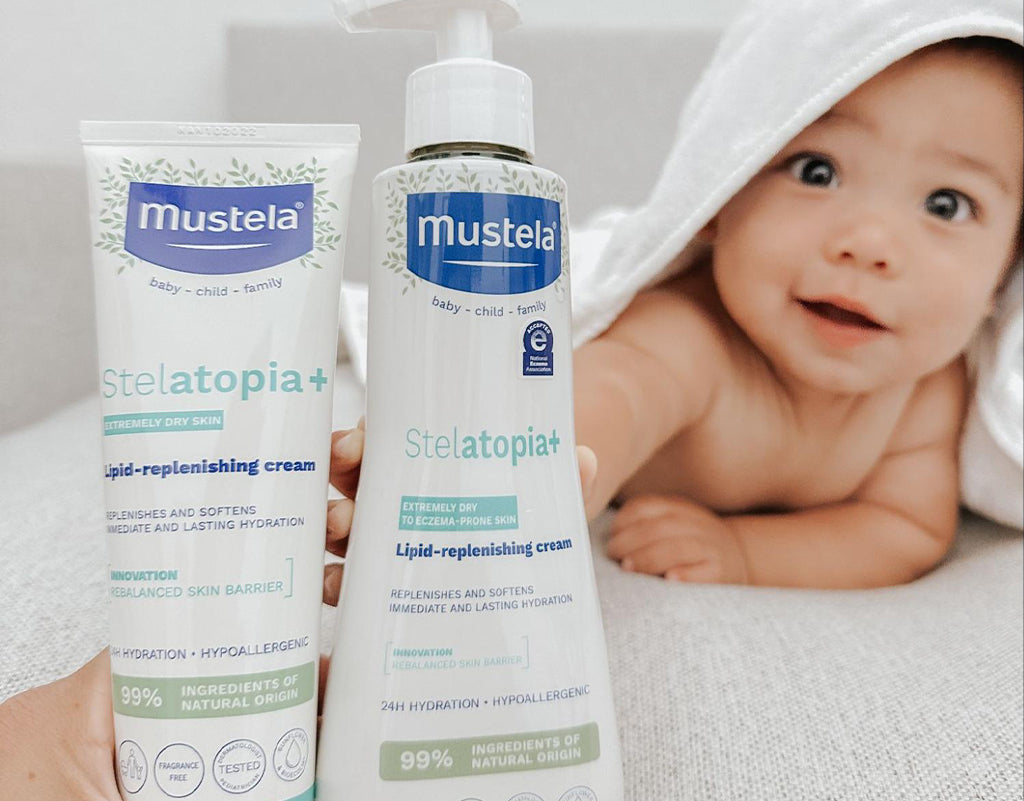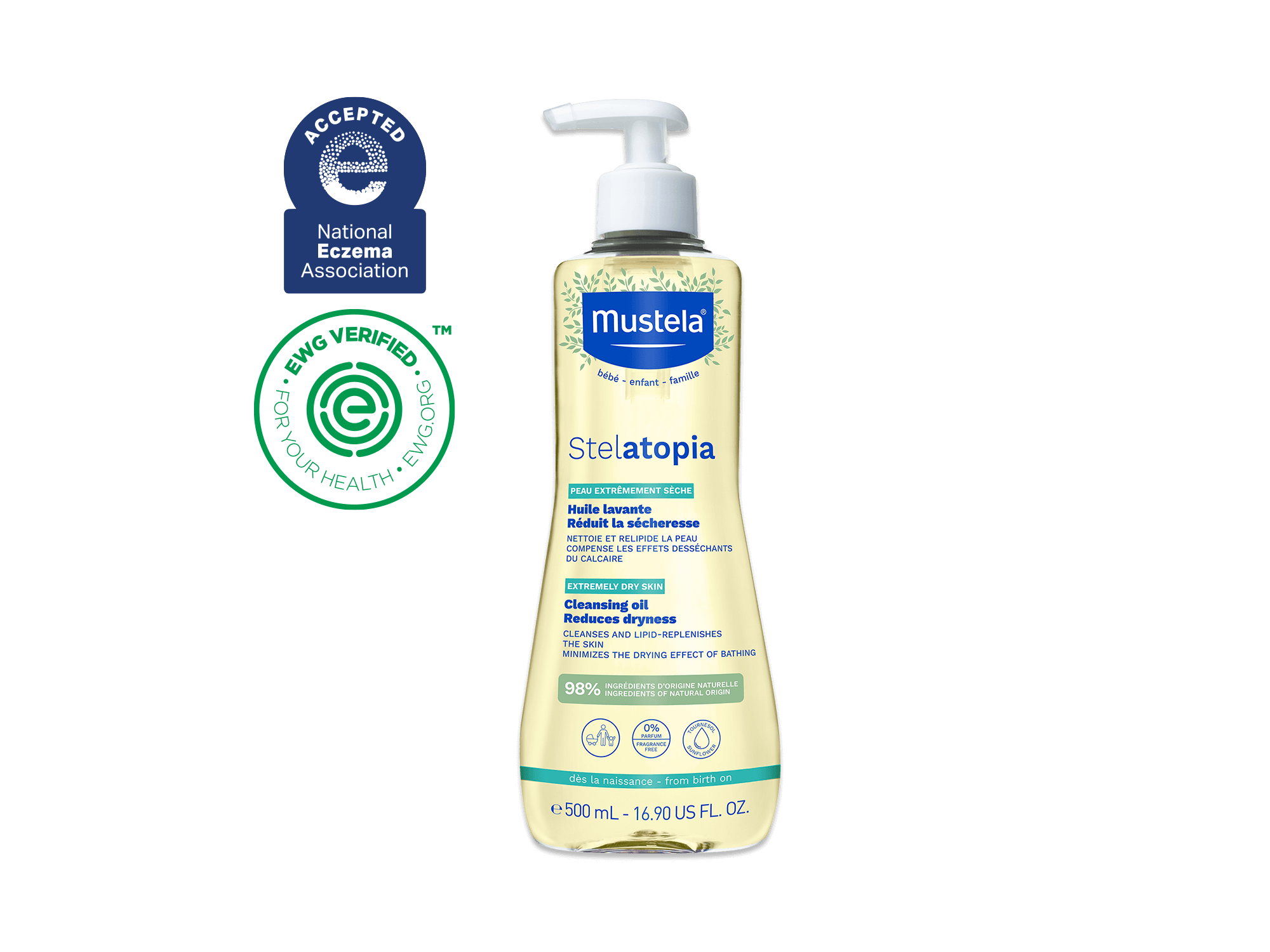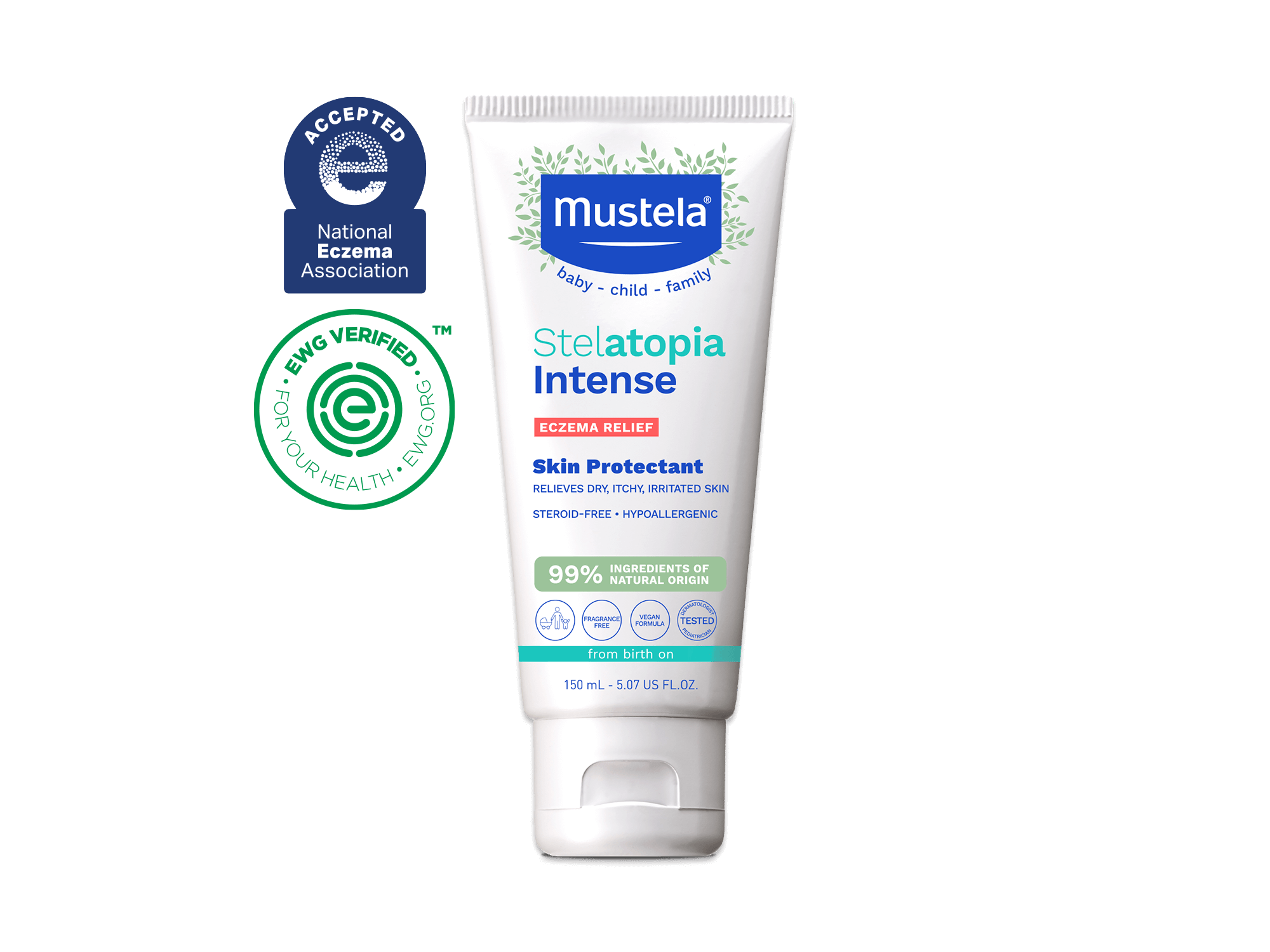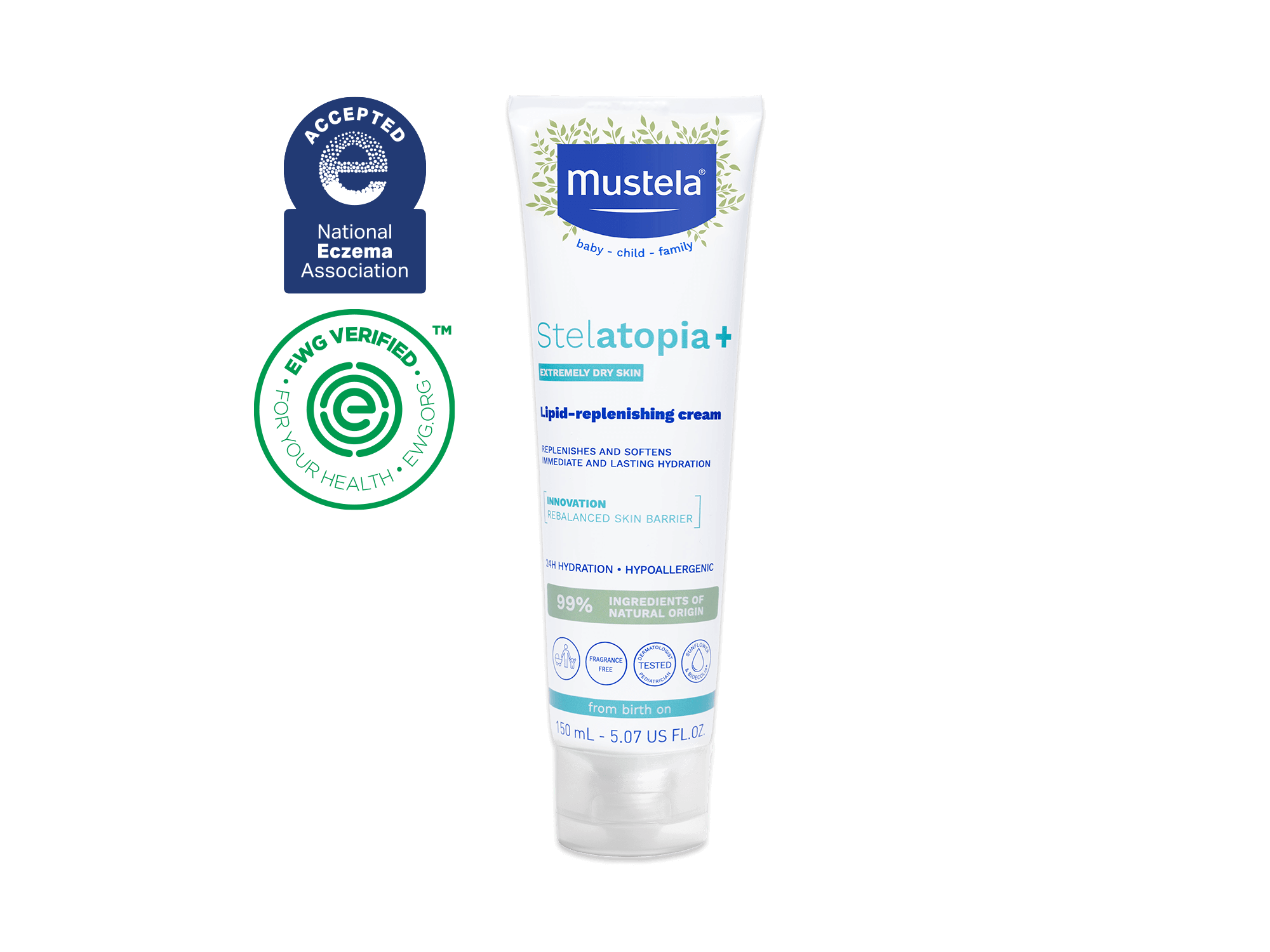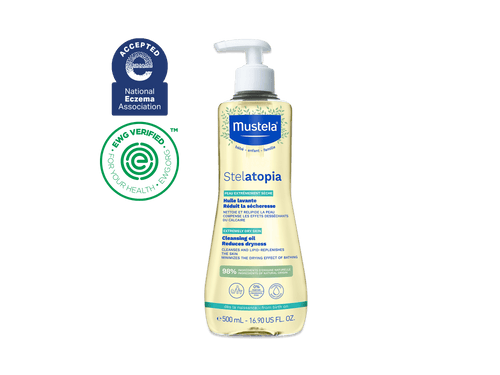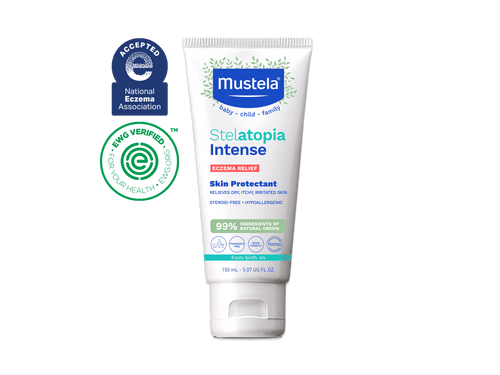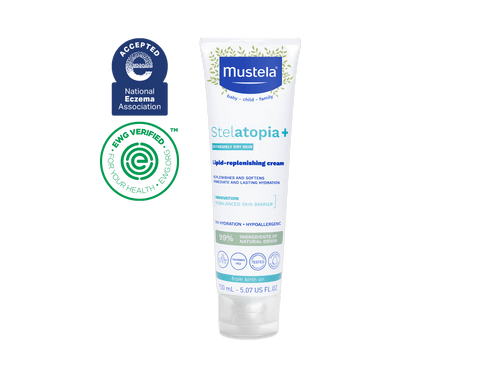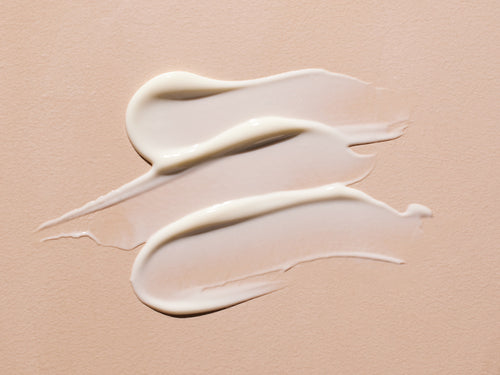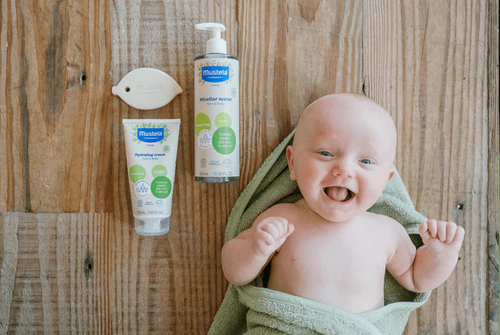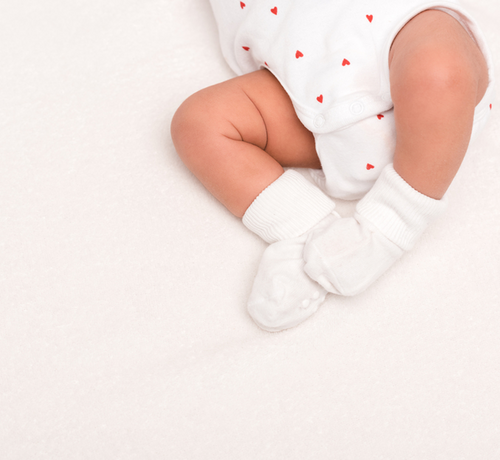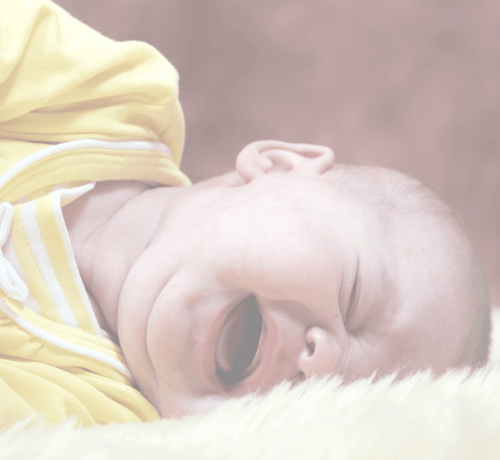Your baby can develop different skin conditions. Most of them are normal, treatable, and common. But how do you know which one your little one has? In this article, we discuss two of the most common ones — baby eczema vs. acne — and how to tell the difference.
By looking at the symptoms of these two conditions, their causes, treatments, and preventative measures, you can help keep your baby’s skin soft and silky.
Table Of Contents
- Baby Eczema Vs. Acne
- Baby Eczema Causes And Treatments
- Baby Acne Causes and Treatments
- When To Contact Your Pediatrician
- Other Skin Conditions Confused With Baby Eczema Vs. Acne
- Prevention Of Baby Eczema Vs. Acne
Baby Eczema Vs. Acne

Baby eczema bears a striking similarity to baby acne. It can sometimes be hard to tell them apart, but some differences can clue you in to which one your baby is experiencing. Let’s take a look at each one in more detail.
What Is Eczema?
Baby eczema is by far the most common rash for babies. The National Eczema Association states that 9.6 million Americans under 18 have some type of eczema. One-third of those people have moderate to severe symptoms.
Eczema is also known as atopic dermatitis — a chronic skin condition that takes the form of red, dry, and itchy rashes on the skin. Other symptoms of baby eczema include:
- Appears mainly on the cheeks and scalp
- Red and oozy bumps
- Ranges from mild to severe
- Usually a family history
- Most scarring resolves over time
Baby eczema typically develops in infants from around the age of six months. Because the condition causes a weakened immune system, it can result in severe allergies as well as itchy skin.
It’s not clear why some babies develop eczema, but doctors believe it’s due to a combination of their environment and genetics.
This chronic condition comes and goes, flaring up with exposure to triggers that range from dry weather to soaps and shampoos.
While there is no cure for baby eczema, there are a variety of treatments, such as our Stelatopia Emollient Cream, to ease your baby’s symptoms. We’ll discuss more of these treatment options a little later in this article.
One piece of good news to note: Although some babies will suffer from eczema into adulthood, many children outgrow it.
What Is Baby Acne?
Baby (or neonatal) acne is a treatable condition that occurs in about 30% of newborns. Some little ones are born with it, while others develop it in their first few weeks of life. The acne most often appears within two to four weeks of birth, commonly on the back, face, neck, or chest.
Baby acne that occurs later than that — between two months to one year — is called infantile acne. It may take longer to clear up and can include blackheads.
Symptoms of baby acne include:
- Small red bumps or pimples
- Located on the face or chest
- Lasts a couple of days to weeks
- No scarring
Continue reading to learn about some of the causes and treatments you can try to better manage and cure baby eczema vs. acne.
Baby Eczema Causes And Treatments
Many skin conditions have similar treatments, but treatment for baby eczema vs. acne is a little different.
For example, the treatment of baby eczema is not as straightforward as the treatment of baby acne. Eczema has more triggers, like genetic, environmental, and dietary factors. This means you may need a multi-prong approach to treating this skin condition.
Let’s take a look at a few of these factors in more detail below:
Genes
Some gene mutations can cause a baby’s skin barrier to malfunction. If your little one has such a gene, they will be susceptible to eczema.
Unfortunately, there’s nothing you can do about your little one’s genes. To ease eczema symptoms caused by genetics, the name of the game is avoiding aggravating triggers and focusing on symptom relief.
Allergens And Skin Irritants

Allergens and irritants also trigger eczema. Things like fabrics, soaps, skincare products, laundry detergents, pet dander, and dust are common culprits.
If you think one of these might be triggering your little one’s eczema, the treatment is pretty straightforward: Just stop using the offending formulas and look for soaps and detergents made to be extra gentle on sensitive skin.
As for your home, try to keep it as dust- and dander-free as possible, regularly cleaning surfaces, vacuuming carpets, and brushing your pet’s fur.
Diet
Eczema can be triggered by common food allergens as well, such as dairy and eggs. It’s definitely worth figuring out any foods your baby is eating that could be aggravating their eczema.
Beyond dairy and eggs, other foods known to trigger eczema symptoms include:
- Fish
- Shellfish
- Soy
- Tree nuts like almonds, cashews, walnuts, and pecans
- Peanuts
- Wheat
- Gluten
To treat eczema flare-ups caused by food sensitivities, avoid whatever caused their skin to react and focus your little one’s diet on probiotic-rich options like yogurt, as well as antioxidant-rich foods like blueberries, strawberries, broccoli, and carrots.
Healthy fats like olive oil and avocado can also help your baby’s skin stay flare-up-free.
Stress
According to some research, another potential cause for baby eczema is prenatal maternal stress. It may be too late at this juncture, but paying attention to your self-care during pregnancy (and beyond) is always a good idea to avoid all sorts of ailments.
Sweat
The warmer summer months can also irritate eczema from sweat that forms in the folds of the skin.
The best thing you can do is limit your baby’s time outside in the heat and make sure they drink plenty of fluids. Also when you’re out and about, keeping them dressed in natural, breathable fabrics will cut down on sweat.
If you notice them sweating while you’re on the go, try patting their face with one of our Organic Water Wipes with Cotton and Aloe.
If you’re at home, our Stelatopia Cleansing Oil and Stelatopia Cleansing Gel can be used to remove salty sweat, as they’re specially formulated for eczema-prone skin.
If your baby’s skin is itchy, you can also apply an ice pack to quell any discomfort.
Dry Climates
If your baby has dry skin, it can be aggravated during colder months, especially if it’s windy. In the winter, you may need to:
- Cover your baby’s skin when going outside
- Remove layers when inside
- Dress your baby in soft fabrics
- Apply sunscreen (yes, even during cold weather!)
- Moisturize their skin frequently
- Stop them from scratching by using soft mittens
Indoor cold is just as bad — too much exposure to air conditioners will make baby’s skin dry and irritated. And it’s not only the cold — dry heat also strips moisture from the air.
That means you’ll want to avoid desert-type climates, indoor environments with heaters, and even cozy fireplaces. If your baby’s been exposed to dry heat, moisturize their skin and get a humidifier to rehydrate the air.

Topical Treatments
If your little one is suffering from baby eczema, regularly using a moisturizing, fragrance-free lotion or cream, like our Soothing Moisturizing Body Lotion or Stelatopia Emollient Cream, can be a great way to reduce your little one’s eczema symptoms. Twice a day is ideal.
Our Stelatopia Intense Eczema Relief is perfect for times when your little one’s eczema flares up. Natural yet effective, this multi-action emollient helps relieve discomfort, itching, and irritation caused by eczema rashes and flare-ups while soothing and restoring skin’s moisture barrier.
Emollients and creams are both effective in creating a protective barrier on the skin to prevent moisture loss while nourishing and soothing. You can even use a gentle Baby Oil after bathing your little one to keep their skin moisturized and soft.
Some soothing ingredients to look for include aloe vera, coconut oil, and sunflower seed oil. Keep in mind the best time to use a moisturizer is straight after your baby’s bath because it will help the skin barrier hold on to hydration.
Speaking of baths, make sure you keep your little one’s baths short (no more than 15 minutes) in warm, not hot, water to prevent further dehydrating their skin. You might want to sprinkle a small bit of colloidal oatmeal in your baby’s bathwater to naturally soothe their skin as well.
Probiotics
According to some studies, powdered probiotics can be added to baby formula to help relieve eczema as a means to balance baby’s skin. You’d want to talk with your pediatrician about this option to see if it’s right for your little one.
When To See The Doctor
If these suggestions don’t work, or in more severe cases, take your little one to the dermatologist. The doctor may be able to prescribe a topical anti-inflammatory medication, like hydrocortisone, to help soothe your baby’s skin, reduce itchiness, and help their skin heal.
Keep in mind hydrocortisone cream is only to be used on babies under the supervision of a doctor.
Baby Acne Causes And Treatments
One of the most common causes of baby acne is a swing in mom’s hormones prior to giving birth. These maternal hormones, now in baby’s body, stimulate your little one’s oil-producing glands, resulting in skin irritation.
Also, as we noted earlier, a baby’s skin isn’t fully developed until age two, meaning it’s easier for dirt to get into their pores and cause irritation and acne.
Baby Acne: Treatment
The good news is that, in many cases, infant acne will disappear as quickly as it arrived without the need for any treatment.
However, you’ll still need to keep the affected area clean by using a mild cleanser and gently patting the skin dry. It’s also important not to over-wash the skin as doing so can leave it more dehydrated and cause additional irritation.
If you feel as if you have to take action to clear up your baby’s skin, here are a few things to keep in mind when treating baby acne. Let’s take a look.
Only Use Acne Treatments Prescribed By Your Doctor
As your baby’s skin is so sensitive, it’s important that you follow your doctor’s lead when it comes to acne treatments and washes. If you use a product that’s too harsh, it could make baby’s acne worse or could lead to blisters or even scarring.
Don’t Rub Or Scrub

Be extra gentle when cleaning your little one’s skin, as it’s already irritated by the acne.
Never Squeeze Baby Acne
You never want to take the teenage route and try to squeeze the acne (teenagers shouldn’t do it either, but try telling them that). Squeezing acne will cause more irritation and possible scarring.
Avoid Oily Or Greasy Skincare Products
When a baby has acne, the oil glands in their skin are overstimulated. It’s best to skip any rich soaps, lotions, or ointments and stick to very mild cleansers and water.
Greasy products that add more oil to their skin will only make matters worse.
Use Lukewarm Instead Of Hot Water
As with treating baby eczema, when cleaning your little one’s skin, be sure the water is lukewarm rather than hot. Hot water strips the skin of necessary oils, further irritating their acne.
Try Breast Milk
There’s no guarantee that this will work, but some moms swear by breast milk as a home remedy to help heal acne-affected skin. Simply dab the area with a small amount of breast milk, and let it work its magic.
When To Contact Your Pediatrician
It’s tempting to go to your pediatrician for any little mark you see on your baby, but that’s not necessary. However, if the bumps look unusual or if your little one seems uncomfortable, you should probably visit the doctor.
Some concerning signs to look out for are:
- Swelling
- Signs of infection
- Fever
- Discharge
Because there’s a variety of childhood skin conditions, your child’s doctor is the best one to reassure you and let you know the right course of action to take.
Other Skin Conditions Confused With Baby Eczema And Acne
Besides baby eczema and acne, there are some other possible reasons your baby’s skin could be irritated. Here are a few common ones.
Milia
With milia, your child’s skin will be bumpy like it is with acne, but the bumps will be white like a whitehead. Nevertheless, treatment advice is nearly identical to baby acne.
Baby Heat Rash
The weather would be a good clue as to the reason for your baby’s red and bumpy skin. Baby heat rash will present as clusters of red bumps on your little one’s limbs, chest, face, and diaper area when it’s hot out.
Cradle Cap
Cradle cap, or seborrheic dermatitis, is another common condition that affects babies’ skin. This generally will appear on the scalp, but it can also spread to the eyebrows and upper body.
Cradle cap looks a bit different than baby acne in that there are not only red bumps but also yellow, flaky, scaly skin as well.
Prevention Of Baby Eczema Vs. Acne

Baby Eczema
Preventing baby eczema may not be 100% possible, just because genetics play a part. However, there are a number of things you can do to address environmental factors that are associated with the condition.
Prenatal Prevention
Before we get into those, it’s important to note that there may be preventative measures you can take while pregnant or breastfeeding to avoid baby eczema altogether. We’ll take a look at those first.
Watch Your Diet While Pregnant
Some experts say baby eczema can be reduced if you are taking probiotics and eating a diet rich in fruits and vegetables, fish, and vitamin D.
Cut Down On Stress When Pregnant
As we mentioned, taking measures to decrease prenatal maternal stress —whether that’s with a yoga class, meditation, or regular deep breathing exercises — can help you avoid this possible cause of the skin condition.
Postnatal Prevention
If your little one does have eczema, then prevention is a matter of avoiding triggers and maintaining a good skincare routine with lots of hydration and a healthy diet.
Here are some steps you can take to help your baby stay eczema-free.
Keep Your Baby On An Eczema Diet
Fill their plate (yours!) with healthy fats and probiotic- and antioxidant-rich foods. Immune-boosting and allergy-friendly options will help stave off future flare-ups as well.
Use Fragrance-Free And Gentle Products
Take a look at your baby’s bathtime and skincare routines to be sure that all products are fragrance-free and gentle.
Hydration is particularly important for babies with eczema, so consider only using lotions or creams specifically formulated for eczema-prone skin.
Dress Your Baby In Natural Fabrics
Also, your baby’s clothing is a common factor in eczema flare-ups, despite how adorable the little outfits are. Make sure to dress your child in natural fabrics, such as cotton, to reduce irritation. If possible, opt for tagless garments as well.
Our Stelatopia Skin Soothing Pajamas are ideal for keeping your little one’s skin comfortable. Using microcapsule technology, these 100% cotton pajamas deliver soothing moisture to the skin throughout the night.
Limit Your Baby’s Time In The Bath
We’ve already talked about keeping the temperature down and the bathtime short to help soothe baby eczema and acne. All of that holds true for preventing future flare-ups, too.
In addition, you’ll also want to limit the number of baths your baby takes in a week to two or three. Too many baths can strip their skin of oil, making them more susceptible to irritation.
Use A Humidifier
If it’s dry inside your home, think about using a humidifier to bring more moisture to the air. The ideal indoor humidity is between 30% to 50%.
Seek Treatment Quickly
It’s important to seek treatment as soon as you notice signs of baby eczema. Doing so can help stop it in its tracks and prevent it from becoming more difficult to treat later on.
This is also important because babies with eczema are more prone to skin infections, which can lead to additional problems down the road.
Baby Acne
According to pediatricians, there’s no definitive way to prevent baby acne. The best thing you can do is take care of your little one’s skin as you normally would.
Use products with natural skincare ingredients to protect your baby’s delicate skin from any skin condition. To help cleanse skin, lock in moisture, and safely treat and prevent baby eczema and acne, Mustela offers safe and effective products for every skin type.
Our No-Rinse Soothing Soothing Cleansing Water, for example, thoroughly and gently cleans your baby's face, body, and diaper area while also working to soothe very sensitive skin. It dissolves dirt and impurities without stripping your baby's skin of its natural oils.
Sunscreen For Baby Eczema Vs. Acne
No matter what skin condition your baby may be facing, it’s always a good idea to apply sunscreen. Mustela provides suncare products that are NEA (National Eczema Association) Certified, fragrance-free, and suitable for sensitive skin.
Of course, sunburn can irritate already dry, itchy, or eczema-prone skin. That’s why we recommend lathering up all year round to help prevent your little one’s skin from getting worse.
Note: Mineral sunscreen, like our line at Mustela, is safer for your baby because it uses two natural minerals — zinc oxide and titanium dioxide — as active ingredients. These minerals simply sit on top of your skin and protect it by reflecting the UV rays away.
Keep in mind that sunscreen should only be used on babies six months and up. Before your little one is six months old, make sure they’re covered up when outside, including with a floppy hat to protect their face.
Healthy Skin For Your Baby

Recognizing the difference between baby eczema vs. acne will give you the knowledge to take care of your little one’s precious skin.
Our Stelatopia Emollient Cream is perfect for everyday maintenance and can also help soothe extremely dry to eczema-prone skin. And when your little one’s eczema flares up, try our Stelatopia Intense Eczema Relief.
Finally, care for your baby’s face with our Soothing Moisturizing Face Cream. This cream helps protect and relieve facial skin and can be used every day. Our fragrance-free formula is specifically designed for babies and children with very sensitive, rashy, or reactive skin.
By taking appropriate prevention and treatment measures for baby eczema and acne, you can help your baby get back to clear, soft skin, and you can have peace of mind knowing that they are happy and irritation-free!

